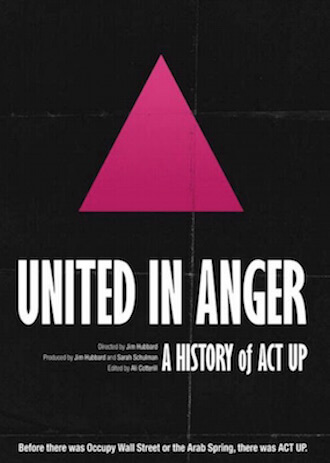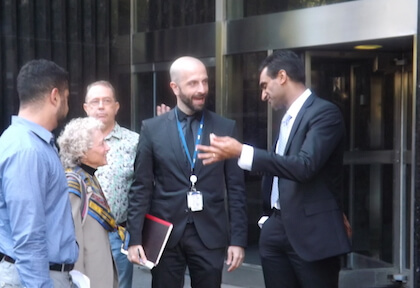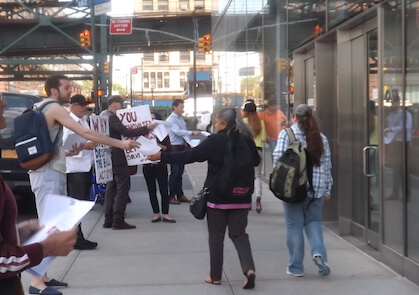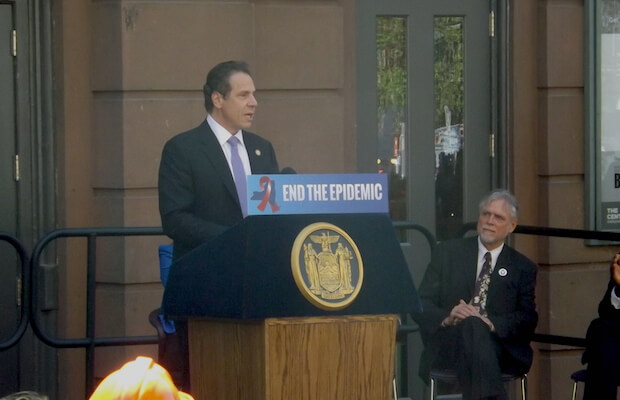US District Judge Samuel Conti ruled on December 3 that two New York realtors violated city law in their responses to a prospective tenant living with AIDS who sought an apartment with financial support from the HIV/ AIDS Services Administration (HASA).
Conti awarded the plaintiff, Keith Short, $20,000 in damages, and also awarded $5,000 in expense reimbursement to the Fair Housing Justice Center (FHJC), the agency to which Short complained about discrimination from Manhattan Apartments, Inc., and Abba Realty Associates. The court also issued expansive injunctive relief against the defendants.
Attorneys Armen Merjian, a senior staff attorney at Housing Works, and Diane Houk of Emery, Celli, Brinckerhoff & Abady represented the plaintiffs.
Short and FHJC contended the defendants violated anti-discrimination provisions of the federal Fair Housing Act regarding disability and city protections based on a prospective tenant’s disability or source of income. Conti found that the defendants did not discriminate against Short based on his having AIDS as such. Instead, the evidence showed the discrimination was against people seeking apartments financed through housing grants from HASA.
Short, diagnosed with HIV in 1989, approached Abba Realty in late 2010 looking for an apartment that he would pay for with HASA financial assistance. He soon learned that not all the apartments listed by the realtor within his price range were available to him — as a “program person” — since the company accepts listings from landlords who will not take tenants relying on HASA funding. The court received testimony that HASA funding is reliable and that delays while the agency inspects and approves apartments are minimal. Still, one apartment that Short was provisionally set to move into became unavailable when the landlord rented to somebody who could pay immediately.
After facing hostility from a building superintendent when he complained about the filthy conditions of a second apartment he was due to move into, Short gave up on Abba and turned to Manhattan Apartments. There, he encountered a real stonewall. That company told him it had no listings from landlords who would rent to HASA clients.
When Short complained to FHJC, the group employed “testers,” actors posing as prospective tenants to confirm Short's story and gather evidence. Neither company attempted to mask its discriminatory policy, unaware, its brokers said, of the City Council law prohibiting its conduct as well as housing discrimination law generally.
In court, FHJC argued the realtors were guilty of disability discrimination under federal law because their refusal to show certain apartments due to source of income had a “disparate impact” on prospective tenants with disabilities. Conti rejected that argument, pointing out that housing support programs assist clients without disabilities as well, so Short’s AIDS status was not the issue.
The judge, however, retained jurisdiction and ruled on the source-of-income claim under New York City law. That claim was crystal clear, since the testimony by Short and the FHJC testers, as well as that from the real estate brokers themselves, provided direct evidence of the discrimination. The defendants argued they were merely following the orders of the landlords and had no intention themselves of discriminating, an argument the court rejected, pointing out that the realtors facilitated the landlords' discrimination by actively screening candidates. There was also no direct evidence the landlords actually discriminated, merely statements from the brokers they had recieved such instructions.
Short ultimately found a satisfactory apartment using another real estate broker, so his actual damages in the case were nominal, but he sought $25,00 from each defendant for “lost housing opportunities and for emotional distress.” Conti settled on $10,000 per defendant.
More important than the monetary damages is the injunctive relief against the two realty companies. They were ordered to stop discriminating against people funding their rentals through HASA grants or other government housing programs, to adopt written non-discrimination policies, and to undertake training for their owners, employees, and any “independent contractor” agents with whom they do business. Since Manhattan Apartments, in particular, is a very large rental broker with thousands of listings, this injunctive relief may help break a logjam for HASA clients searching for apartments.
The New York Law Journal reported the plaintiffs' attorneys will apply for legal fees authorized for the “prevailing parties” under city Human Rights Law. Since this case involved significant investigation and a four-day trial, such an award is likely to dwarf the damages awarded to Short and FHJC.
Merjian told the Law Journal the sum could be “in the hundreds of thousands of dollars,” a large portion of which, in Housing Works’ case, would go toward its mission of helping people living with HIV secure appropriate housing. He said he believed this was the first case that had gone to trial since the city ban on source-of-income discrimination was enacted in 2008, all previous cases having been resolved through settlements or pretrial dismissals.
In a Housing Works press release, Merjian said, “This decision reveals that notwithstanding the law, companies continue blatantly to discriminate against indigent, disabled individuals who rely on government subsidies to pay their rents. It’s hard enough for such individuals to find affordable housing in New York City without facing this crushing and widespread discrimination.”

































